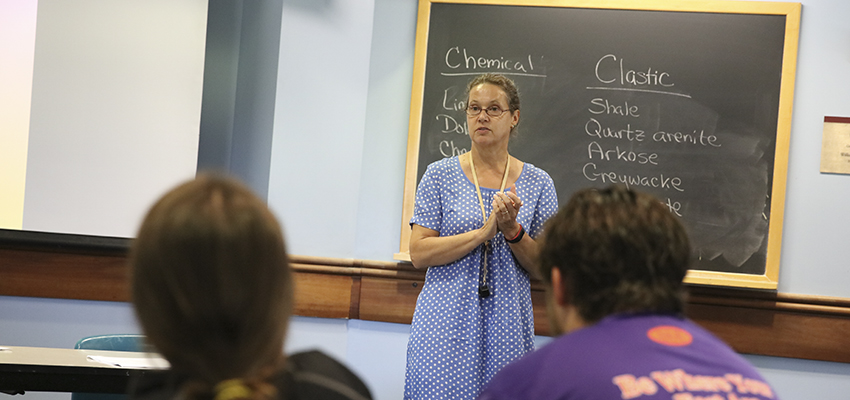
HWS News
16 May 2019 • STEM Bringing Disciplines Together Through Open-Source Data Analysis
When it came time for Professor of Geoscience Nan Crystal Arens to teach a data science class, she took an entrepreneurial approach. Rather than only work with students from her own discipline, she saw an opportunity to bring together students from diverse fields, including psychology, economics, sociology and computer science. In the fall of 2019, she will team up with Digital Learning Consultant Rob Beutner to lead Data Science with R & Python: Publishing While Female.
R and Python are free, open-source computing environments. Python is used for a wide variety of applications, while R focuses on statistical computing, data analysis and visualization. Proprietary software has historically been the norm when it comes to data analysis, but R is fast becoming an industry standard.
Data science skills are increasingly in demand across a wide range of fields, including STEM, social science and humanities. Arens and Beutner saw an opportunity to help students from across disciplines to build their skills and their resumes.
Arens had used R while working with a student on his Honors project. Eventually, the student asked her to teach him how to use it, too. "He walked right out of here and got a job simply because he had this experience," says Arens.
Statistical analysis requires both a question and a data set that is used to uncover answers. Because Arens wants students to focus on the data science and obtaining hands-on experience using the software, she will provide the question for the class: "Are women held to a higher standard when publishing in STEM peer-reviewed journals?" The question was inspired by University of Liverpool economist Erin Hengels 2017 examination of women-authored articles in economics journals.
"At HWS, we have a fabulous tradition of looking at social difference and social positionality and how that affects our trajectory through life," says Arens. "So I think this question will resonant."
The experimental course is open to students at all levels, from any major. While no previous experience with R or Python is required, those who enroll should be comfortable working in an independent, asynchronous environment. Students will be assigned specific tasks in R and Python, after which the class will come together to discuss their findings.
Arens is looking forward to working with students from outside her department. "We get better results if we have diverse perspectives," she says. "Everybody's voice is equal in the room, and that kind of culture is endemic in the open-source community. We want to teach students how to work in that environment."
